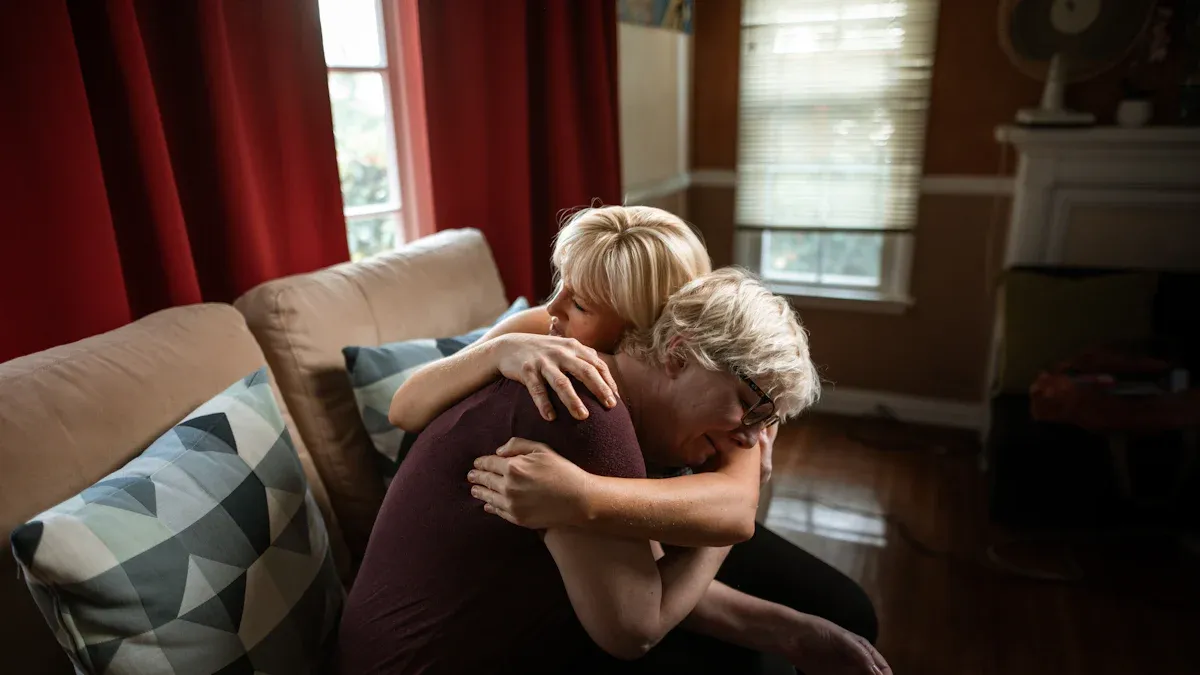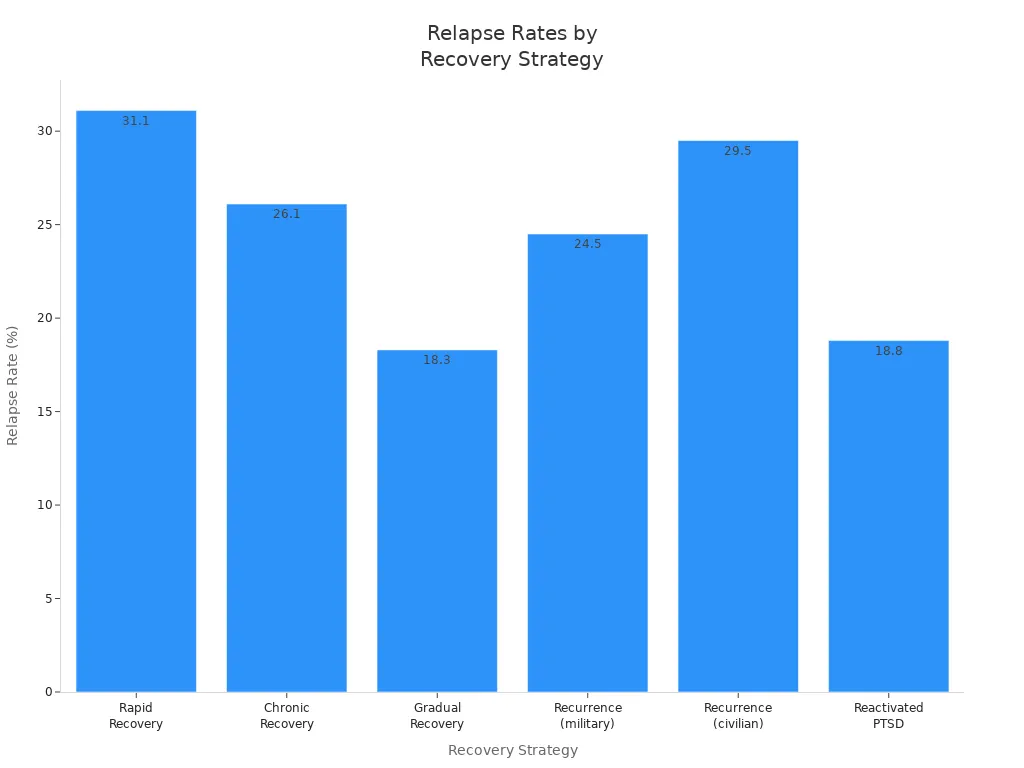Healing from C-PTSD After Narcissistic Abuse: A Survivor's Guide

Narcissistic abuse can make you feel lost and alone, especially when navigating complex PTSD narcissistic abuse recovery. You may wonder why it is hard to trust people, and anxiety might seem to follow you everywhere you go. Studies show that 21.1% of women who face intimate partner violence develop complex PTSD. If you feel emotional pain or confusion, you are not alone. Here are some common symptoms survivors talk about:
Symptoms | Description |
|---|---|
Confusion | You might feel unsure about what is real because of manipulation. |
Anxiety | You may feel worried and alert all the time. |
Depression | Sadness and hopelessness can feel too much to handle. |
Restlessness | You could feel nervous even after the abuse stops. |
Trauma Bonding | Feeling close to your abuser can make healing harder. |
Trust Issues | Trusting others may seem impossible after being manipulated. |
You deserve kindness and help. Recovery from complex PTSD after narcissistic abuse is possible, and you can find hope and healing.
Key Takeaways
What You Need to Know
- C-PTSD differs from standard PTSD — It develops from prolonged, repeated trauma rather than a single event, making narcissistic abuse survivors particularly vulnerable to this condition
- Recognition is the first step — Common symptoms include emotional flashbacks, chronic shame, difficulty trusting others, and a persistent sense of emptiness or hopelessness
- Healing is not linear — Expect setbacks and difficult days; progress often happens in waves rather than a straight upward trajectory
- Professional trauma-informed therapy is essential — Approaches like EMDR, somatic experiencing, and Internal Family Systems (IFS) have shown significant effectiveness for C-PTSD recovery
- Establish safety before processing trauma — Focus first on stabilization, grounding techniques, and building a support network before diving into deep trauma work
- Self-compassion accelerates recovery — Research shows that treating yourself with the kindness you'd offer a friend reduces shame and supports nervous system regulation
- No contact or low contact protects your healing — Maintaining boundaries with your abuser isn't selfish; it's a necessary foundation for recovery and prevents re-traumatization
Not Sure If You Are Been Gaslighted?
Sometimes it's hard to recognize gaslighting and emotional manipulation. Our Gaslighting Check app helps you identify patterns and provides personalized guidance based on your specific situation.
Try Gaslighting Check App NowHow Narcissistic Abuse Causes Complex PTSD
Emotional Abuse Tactics
Narcissistic abuse often begins with emotional manipulation. Your abuser may treat you kindly, then suddenly act mean. Sometimes you feel loved, but then you feel confused or controlled. This pattern is called love-bombing. It makes you unsure of yourself and what is real.
According to the World Health Organization's ICD-11 research (2022), Complex PTSD affects approximately 1-8% of the global population, with significantly higher rates among individuals who experienced prolonged interpersonal trauma such as emotional abuse—studies show up to 33% of those in abusive relationships develop Complex PTSD symptoms.
Gaslighting is another way abusers hurt you. They might say your memories are wrong or your feelings do not matter. You start to doubt what you remember. You may feel like you have to be careful all the time. You worry about what will happen next.
Here are some effects you might notice:
Emotional flashbacks that remind you of bad times
Staying away from places or people linked to the trauma
Feeling nervous or scared in normal situations
Having trouble handling your feelings
Feeling shame, guilt, or like you are not good enough
Finding it hard to trust people
Forgetting things or losing focus
If you feel confused or anxious a lot, it is not your fault. These feelings are normal after emotional abuse.
Chronic Trauma Effects
If abuse happens again and again, your mind and body stay on high alert. You may feel stressed even when things seem safe. This stress can change how your brain works. You might feel numb or not connected to your feelings. Sometimes you forget parts of your life.
"Complex PTSD is a normal reaction to an abnormal situation. When someone is repeatedly exposed to narcissistic abuse—the gaslighting, the emotional manipulation, the constant invalidation—their nervous system adapts to survive. The symptoms we see aren't weakness; they're evidence of the brain doing exactly what it's designed to do under chronic threat."
— Dr. Ramani Durvasula, Clinical Psychologist and Professor at California State University Los Angeles
Manipulation and gaslighting can make things worse. If someone keeps saying you are wrong or crazy, you might believe it. You may stop trusting yourself. This can cause:
Hypervigilance, where you are always watching for danger
Trouble sleeping or relaxing
Feeling numb and not caring about things
Dissociation, where you feel far away from yourself
Trouble setting limits with others
Low self-esteem and feeling unworthy
Problems with memory and paying attention
You deserve to feel safe and strong. Healing takes time, but you can learn to trust yourself again.
Loneliness and Isolation
Narcissistic abusers may try to keep you away from friends and family. You might feel alone and helpless. Being cut off makes it hard to see what is happening or ask for help. You may pull away from others, even after the abuse ends.
Feeling lonely can make your symptoms worse. You might think no one understands you. You may wish someone would listen and believe you. This can lead to:
Staying away from people and feeling alone
Not trusting others, even those who care
Wanting someone to understand but being scared to ask
Needing support to heal in your own time
Remember, you are not alone. Getting help from others can help you feel understood and give you strength to heal.
Symptoms

Emotional Signs
Complex PTSD from narcissistic abuse can make your feelings change quickly. You might feel very sad or angry without warning. Many people have:
Flashbacks that bring back bad memories
Staying away from things that remind you of the trauma
Feeling nervous or always looking for danger
Finding it hard to calm down after getting upset
Feeling shame, guilt, or like you are not good enough
Having trouble trusting others, even people who care
You might feel numb or not connected to your feelings. Sometimes, you may think it is your fault. These feelings can make you want to be alone. This can lead to feeling lonely.
It’s okay if your feelings seem hard to understand. Everyone feels different, and you are not alone.
Cognitive and Physical Symptoms
Complex PTSD does not only change your feelings. It can also affect your mind and body. You might forget things or have trouble focusing. Some people feel like their mind goes blank or forget parts of their life.
Here’s a quick look at some common symptoms:
Symptom Type | cPTSD Severity | ncPTSD Severity |
|---|---|---|
Visual Memory Problems | Higher | Lower |
Trouble Paying Attention | Higher | Lower |
Emotional Ups and Downs | Present | Less Present |
Relationship Struggles | Significant | Less Significant |
You might also have headaches, stomachaches, or trouble sleeping. Sometimes, your body feels tense or tired all the time. These signs can make daily life harder.
Relationship Issues
Narcissistic abuse can make it hard to connect with others. You might find it tough to trust new people or make friends. Some common problems include:
Staying away from relationships because you are scared of getting hurt
Feeling alone, even when you are with others
Having trouble talking about your feelings
Getting close to people who act like your abuser
Feeling like you are not the same person as before
You may notice you pull away from loved ones or feel misunderstood. Healing takes time, but asking for help can help you trust again and feel less alone.
Complex PTSD Narcissistic Abuse Recovery

Professional Help
Starting recovery can feel scary and confusing. Many people get help from a therapist. Therapists use different ways to help you heal. Some focus on feelings and memories. Others help you change negative thoughts. They teach new skills to help you feel better.
Research published in the Journal of Traumatic Stress (2021) offers encouraging news: trauma-focused therapies such as EMDR and prolonged exposure therapy show 60-80% effectiveness rates in reducing PTSD symptoms, with many Complex PTSD survivors reporting significant improvement within 12-16 weeks of consistent treatment.
Here’s a table with some therapy choices:
Therapy Type | Description |
|---|---|
Internal Family Systems (IFS) | Uses a gentle way to help you heal deep emotional pain. |
Trauma-Focused Therapy | Uses EMDR and other tools to help you deal with hard memories. |
Schema Therapy | Helps you change bad beliefs about yourself from the abuse. |
Dialectical Behavior Therapy (DBT) | Teaches you how to handle strong feelings and build good relationships. |
You can also try Cognitive Behavioral Therapy (CBT). CBT helps you fight negative thoughts and take back control. Therapists who know about trauma help you set boundaries. They teach you how to trust and feel safe with others. They show you ways to be kind to yourself.
Tip: You deserve help. Therapy is not weakness. It is a step to healing.
Support Systems
You do not have to recover alone. Support systems help a lot. Family and friends can comfort you and help you feel less lonely. Talking to someone who understands can make things easier.
"Healing from abuse requires us to reclaim the reality that was stolen from us. Abusers work hard to make their victims doubt their own perceptions. Recovery begins when survivors learn to trust what they know to be true about their own experience."
— Lundy Bancroft, Counselor and Author of Why Does He Do That? Inside the Minds of Angry and Controlling Men
Peer support groups let you share your story. Others in the group have been through similar things. You can learn tips and feel understood. Online communities, like Circles, offer group therapy and support. These groups help you feel connected and give you a safe place to talk.
Support systems give you help and comfort.
Friends and family can protect you and help you feel safe.
Peer groups teach you to trust and share your feelings.
Online support makes it easy to find help if you feel alone.
Note: Good relationships help you handle symptoms and feel better.
Self-Care Strategies
Taking care of yourself is important for recovery. Self-care helps your mind and body heal. Start with small steps. Try breathing exercises to calm down. Meditation and mindfulness help you stay present and handle tough feelings.
Here are some self-care ideas:
Practice slow breathing to relax.
Join peer support groups for connection.
Eat healthy foods and exercise to feel better.
Write in a journal to understand your feelings.
Use grounding techniques to stay focused when you feel stressed.
A study found that exercise can lower PTSD symptoms. It also helps sleep, anxiety, and depression. Regular self-care helps you feel better and brings back normal life. When you care for yourself, you show you matter.
Remember: Self-care is not selfish. It helps you heal and grow.
Boundaries and Control
Setting boundaries is important for recovery. Boundaries help you stay safe and take back control. Learn about narcissistic behavior to know what to expect.
Here are ways to set boundaries:
Speak clearly and directly.
Use “I” statements to say what you need.
Set limits and explain what happens if someone crosses them.
Be consistent and keep your boundaries every time.
Be ready for pushback and stay strong.
Practice emotional detachment to avoid drama.
Make self-care important.
Ask a therapist for extra help.
Taking control helps you feel safe and strong. You learn the abuse was not your fault. This helps you heal and build better habits. You can try journaling and positive affirmations to feel better about yourself. Many people find writing down feelings helps them heal faster.
Callout: Setting boundaries is hard at first, but it gets easier. You have the right to protect your space and peace.
Recovery takes time. You may face problems like trusting again, feeling safe, and finding your worth. Being alone can feel safe, but reaching out helps you heal. Every step brings you closer to feeling whole.
You can get better after complex PTSD from narcissistic abuse. Many people feel sad, have trouble trusting, and must make hard choices. You are not alone in this. Therapy, self-care, and support groups help you heal. Most people do best with a step-by-step plan. Relapse rates are not the same for everyone, so keep trying.

Here are some things that can help you:
Type of Resource | Description |
|---|---|
Practitioners | Therapists and experts for complex PTSD and narcissistic abuse |
Websites | Online platforms with survivor support and information |
Podcasts | Audio stories about recovery and healing |
Treatment Options | Different therapies for recovery |
Community Groups | Support networks for sharing experiences |
Recommended Books | Guides and insights for healing |
Try these tips:
Make good boundaries.
Be kind to yourself.
Find people who support you.
Use helplines and online forums for help.
Healing takes time, but you can get better. You deserve care and people who understand you.
FAQ
What is the difference between PTSD and complex PTSD?
PTSD usually comes from one big trauma. Complex PTSD happens after many traumas over time, like ongoing abuse. You might notice more problems with trust, emotions, and relationships with complex PTSD.
Can you recover from complex PTSD caused by narcissistic abuse?
Yes, you can heal. Recovery takes time and support. Therapy, self-care, and safe people help you feel better. You do not have to do it alone.
How do I know if I am being gaslighted?
You might feel confused or doubt your own memories. Someone may tell you things did not happen or that you are too sensitive. If you feel lost or question yourself a lot, you could be experiencing gaslighting.
What should I do if I feel alone during recovery?
Try reaching out to a support group or a trusted friend. You can also join online communities. Remember, you are not alone. Many people want to help and listen.